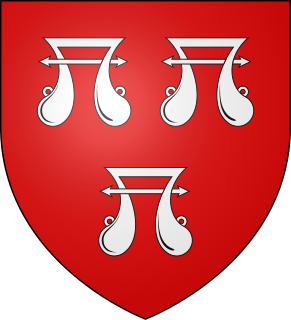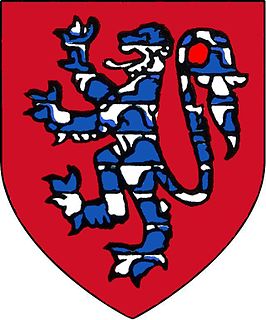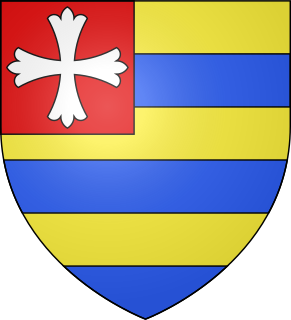
Ralph de Stafford, 1st Earl of Stafford, 2nd Baron Stafford,, KG, of Stafford Castle and Madeley Castle in Staffordshire, was an English nobleman and notable soldier during the Hundred Years War against France.

William Ros or Roos, 1st Baron Ros of Helmsley, was one of the claimants of the crown of Scotland in 1292 during the reign of Edward I.

Edmund Mortimer, 2nd Lord Mortimer was the second son and eventual heir of Roger Mortimer, 1st Baron Mortimer. His mother was Maud de Braose. As a younger son, Edmund had been intended for clerical or monastic life, and had been sent to study at Oxford University.
Patrick IV, Earl of March, sometimes called Patrick de Dunbar "8th" Earl of March, was the most important magnate in the border regions of Scotland. He was one of the Competitors for the Crown of Scotland.
Patrick III, 7th Earl of Dunbar was lord of the feudal barony of Dunbar and its castle, which dominated East Lothian, and the most important military personage in the Scottish Borders.
Roger Damory, Lord d'Amory, Baron d'Amory in Ireland, was a nobleman and Constable of Corfe Castle.
Robert II de Brus, le Meschin , was a 12th-century Norman noble and 2nd Lord of Annandale. He was the son, perhaps the second son, of Robert de Brus, 1st Lord of Annandale.

Thomas de Berkeley, 1st Baron Berkeley, The Wise, feudal baron of Berkeley, of Berkeley Castle in Gloucestershire, England, was a peer, soldier and diplomat. His epithet, and that of each previous and subsequent head of his family, was coined by John Smyth of Nibley (d.1641), steward of the Berkeley estates, the biographer of the family and author of "Lives of the Berkeleys".
John (II) de Mowbray, 3rd Baron Mowbray was the only son of John de Mowbray, 2nd Baron Mowbray, by his first wife, Aline de Brewes, daughter of William de Braose, 2nd Baron Braose. He was born in Hovingham, Yorkshire.

Thomas Burgh, 1st Baron Burgh also spelt Borough, KG, 1st Baron Borough of Gainsborough, also de jure 5th Baron Strabolgi and 7th Baron Cobham of Sterborough, was an English peer. In 1513 he was knighted on Flodden Field, where he was one of the King's Spears, a bodyguard of King Henry VIII. He later became Lord Chamberlain to Anne Boleyn. He was also one of the twenty-six Peers summoned to the trial of Anne Boleyn in May 1536.

George de Dunbar, 10th Earl of Dunbar and March (1338–1420), 12th Lord of Annandale and Lord of the Isle of Man, was "one of the most powerful nobles in Scotland of his time, and the rival of the Douglases."

Thomas de Morley, 4th Baron Morley, KG was a baron in the Peerage of England, Lord of Morley, Hingham, Hockering, &c., in Norfolk, de jure Lord Marshall, hereditary Earl Marshal of Ireland, and a Privy Councillor. He was summoned to parliament from 20 October 1379 to 3 September 1416.
John Montagu, 3rd Earl of Salisbury and 5th and 2nd Baron Montagu, KG was an English nobleman, one of the few who remained loyal to Richard II after Henry IV became king.

John Grey, 1st Earl of Tankervillejure uxoris6th Lord of Powys, KG, was an English peer who served with distinction in the Hundred Years' War between England and France under King Henry V.
Richard Grey, 3rd Earl of Tankerville, 8th Lord of Powys fought on the side of the House of York in the War of the Roses.
Edward Montagu, 1st Baron Montagu was an English peer. He fought at the Battle of Crecy. His first wife, Alice of Norfolk, the granddaughter of Edward I, died as the result of an assault committed by Montagu and his retainers.

Baron Everingham is an abeyant title in the Peerage of England. It was created by Writ of summons to Parliament of Adam de Everingham of Laxton, Nottinghamshire, on 4 March 1309. It passed to his son Adam but fell into abeyance upon the death of his childless grandson Robert in 1371.

Sir William de Aton, 2nd Baron Aton, of Ayton and Malton Yorkshire was a 13th-14th century English noble. He died c. 1388.

Richard Stafford, 1st Baron Stafford of Clifton, Lord of Clifton, was an English soldier and diplomat during the Hundred Years' War. He was the second son of Edmund Stafford, 1st Baron Stafford and Margaret Basset, and the younger brother of Ralph Stafford, 1st Earl of Stafford.

Sir Adam de Everingham, 1st Baron Everingham, Lord of Laxton, was an English noble.











